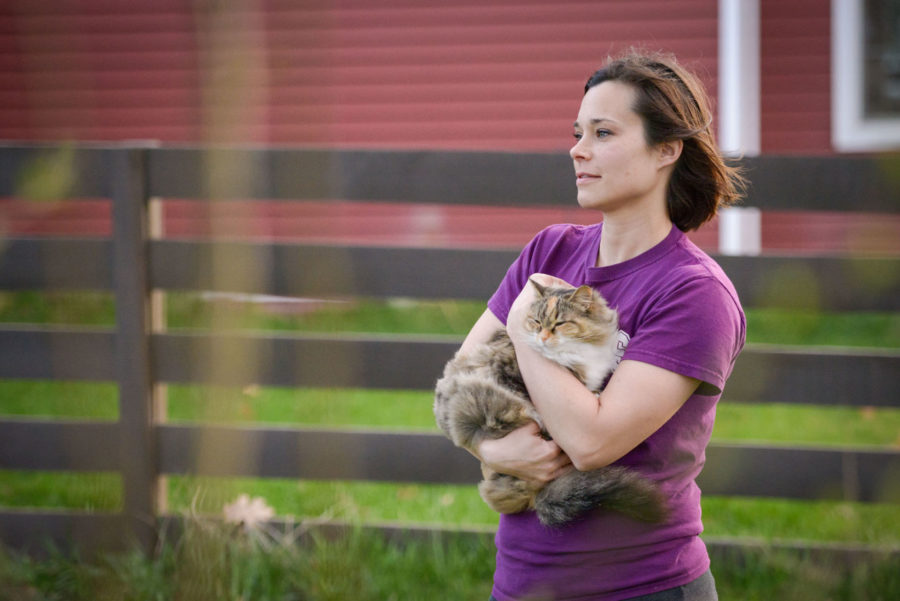Country Cats gives unwanted pets a second chance
Apr 13, 2015
Hissy, a gray-and-orange-striped cat with a white bib and fluffy fur, burrows into thick blankets stacked on a china hutch inside the Smith family’s garage.
Somewhere in the building, hiding under old children’s toys or behind storage boxes, their other cat, Hidey, is being true to his name.
The two cats live inside the garage year-round. While the living situation may not seem luxurious, the pets wouldn’t have a home otherwise.
They were given this home by the “Country Cats” program, which was founded in the Urbana area last summer to give cats with behavioral issues new homes by placing them in barns. Since July, they have relocated 98 cats.
“It provides an opportunity for cats who wouldn’t get adopted in shelters to have a second chance,” said Teri Kidd, Shelter Medicine intern for the University’s veterinary medicine program.
Get The Daily Illini in your inbox!
Kate McGinley, shelter manager at the Champaign County Humane Society, a group of what she calls “cat people,” including members of CatSnap, Animal Control and the humane society, came up with the idea when they met last summer to brainstorm a solution for the unadoptable, healthy cats.
“We came up with the name ‘Country Cats’ and it just sort of took off from there,” she said.
Cats qualify for this program if they are feral or have aggression or urination issues. If it were not for this program, the cats would be euthanized because they cannot be adopted, McGinley said.
“Despite what people think, people at shelters never get hardened to euthanasia,” she said. “It’s really wonderful to have an option.”
McGinley has adopted a cat for her horse stable, and said that even though he was front-declawed, he has no problem catching mice and fending for himself.
Leslie Smith, Hissy and Hidey’s adopter and a professor at Parkland College, said pest control was one of the benefits of barn cats.
“They’ve caught a lot of mice, and it’s just been fun to have another pet that you don’t have to take care of that much,” she said. “You feed them, you give them water, and you don’t have to have a litter box because they go outside.”
Smith learned about Country Cats from a friend who posted on Facebook. Her family adopted three cats, but one ran away. Her father adopted two cats for his land, and a family friend adopted five. Kidd said placing 10 cats from just one contact was one of their success stories.
When someone is interested in adopting a cat, they call Country Cats or the Champaign County Humane Society and are put on a waiting list. Currently, there is a waiting list for 10 cats, Kidd said.
She added that while the program always welcomes donations, their primary need is finding homes for the cats.
According to the Country Cats website, the program works with shelters and clinics in Champaign, Coles County, Farmtown, Paxton, Macon County and Vermilion County.
“I don’t think we have hit a limit yet,” McGinley said in regards to how far away they will send a cat. She said it “depends on how far someone’s willing to drive.”
The cats are free to a good barn, and Country Cats provides medical attention and basic supplies, Kidd said. This includes spaying or neutering, vaccinating, deworming and cleaning any other wounds.
“We’d never send somebody out there that needs medical attention,” Kidd said.
Once the cat is sterilized, a small green line is tattooed next to the scar so a future veterinarian will not operate again.
For two weeks, the cats must be confined in large cages, so they can familiarize themselves with their new surroundings.
“Cats are very adaptable,” Kidd said. “Until they realize, ‘this is where my food is, this is where my shelter is,’ if you just release them, they’re very likely to just run off.”
A student volunteer takes the cat to its new home, along with a cage, a bag of food and litter, bowls and a litter box if the adopter needs it.
The program works with the Illinois Student Chapter of the Association of Shelter Veterinarians and hires students as coordinators, Kidd said.
Tara Poyer, first-year student in Veterinary Medicine, is one of the students involved with “Country Cats.”
Poyer is a member of ISCASV and said she was drawn to Country Cats due to her passion for helping homeless animals.
“It really bothered me that perfectly healthy cats were being euthanized for things they couldn’t help or the owners just didn’t want to deal with,” she said.
One of her inspirations for working with the program was Julius, an orange tomcat and inappropriate urinator who was deemed unfit to be a housecat. Poyer said she wanted to help cats like him, as well as cats who do not work well in shelters.
“If someone tried to touch me when I was scared, I’d probably run away and hiss too,” she said.
Cats who are scared in the unfamiliar shelter environment will become aggressive or skittish, which deters people from adopting them, according to McGinley. The cats that are relinquished to the shelter for these reasons “often make the best barn cats,” she said.
“It just seems unfair for a cat who’s just trying to look out for itself to not have a chance at a home,” Poyer said. “Country Cats gives them a chance.”






